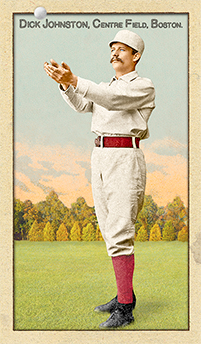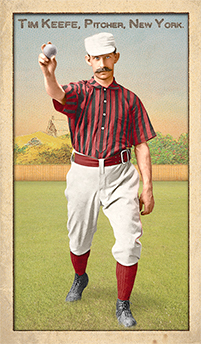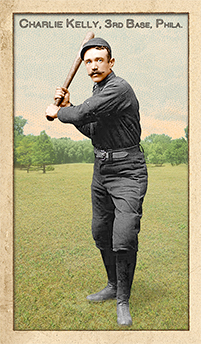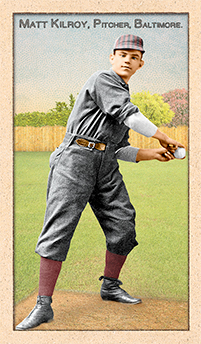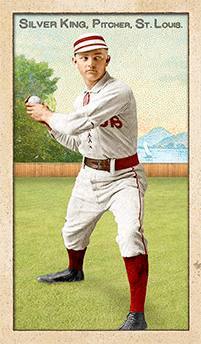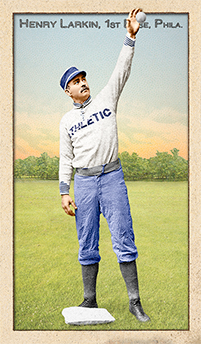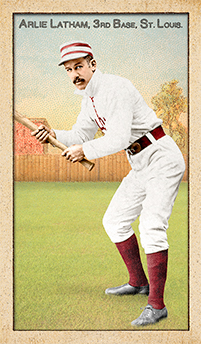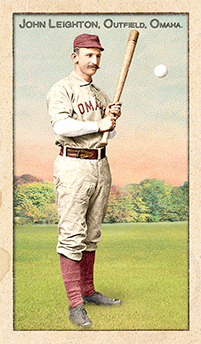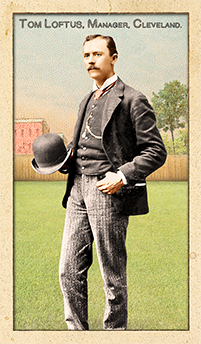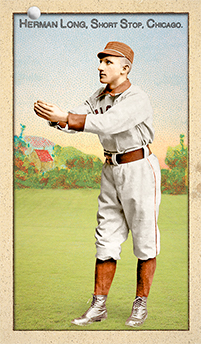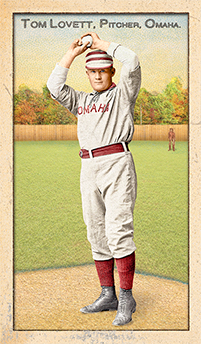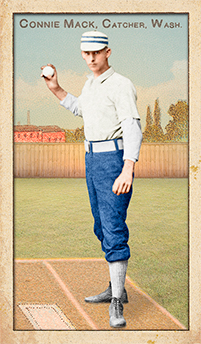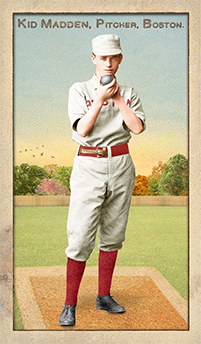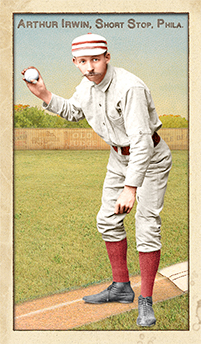
- Series: Beginnings: 1880's
- City: Philadelphia
- Team: Quakers
- League: National League
- Hall: Canadian Baseball Hall of Fame
Doc, Sandy, Cutrate, Foxy (1863-1927). Born in Canada, Arthur Irwin was: the 1st position player to wear a glove; a winning participant in the 1st interleague series to crown a "World Champion" club, the 1884 Providence Grays; a college coach; an MLB scout & an MLB business manager; a minor league owner; a major & minor league manager; the president of the 1st professional U.S. soccer league; an owner of cycling tracks; the inventor of a football scorecard; and an umpire of 50 National League games. Arthur Irwin is also a member of the Canadian Baseball Hall of Fame. After contracting stomach cancer, Irwin committed suicide by jumping over board a ship. It was soon discovered that Arthur Irwin had two unwitting wives, 1 in Boston, 1 in New York.
- In 1907, NY Highlanders' manager George Stallings rented a flat overlooking Hilltop Park and, equipping Irwin with binoculars and mirrors, had Irwin steal signs from NY's opponents and reflect them back to Stallings in the dugout.
- Irwin signed Lou Gehrig to his first professional contract, with the Hartford Senators in 1921. Although Gehrig used the alias "Lou Lewis" to hide his professional status from Columbia University, the ruse was discovered and Lou was forced to sit out a year of college ball.
- Irwin managed the Washington Nationals (1889), Boston Reds (1891), Philadelphia Phillies (1894-1895), NY Giants (1896) & the Washington Senators (1898-1899)
- While with the Providence Grays in 1883, Irwin broke two fingers on his left hand. Determined not to miss any games, Irwin got a buckskin glove, added padding and sewed two fingers together to allow his bandaged fingers to fit. After his injuries healed, Irwin kept with the glove. John Motgomery Ward soon followed. By the next season, 1884, most professional players were using the Irwin Glove.
- Elected to Canadian BB Hall of Fame: 1989
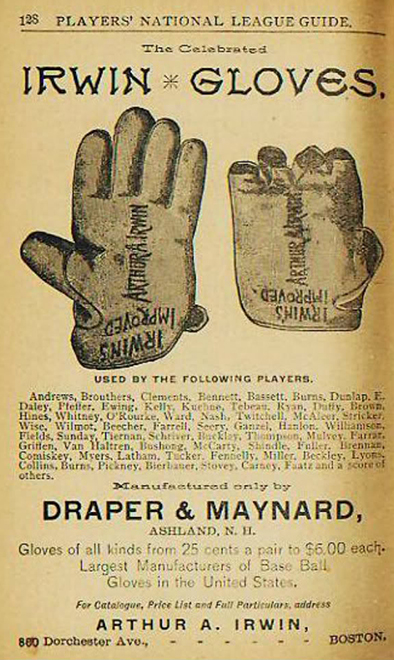
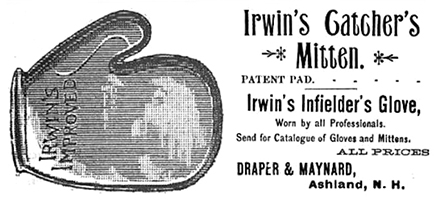
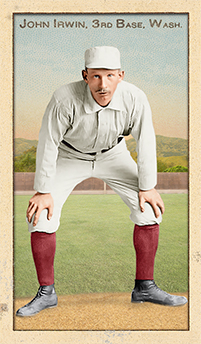
- Series: Beginnings: 1880's
- City: Washington, D.C.
- Team: Nationals
- League: National League
John Irwin (1861-1934) followed elder brother Arthur out of Toronto and into American baseball, joining Art’s Worcester Ruby Legs when they were a National League entry in 1882. Art had been with the team since 1880 and was an established star when John debuted, getting into a single game that season. The younger Irwin played his most substantial year in ‘84 with the upstart Union Association’s Boston Reds under the tutelage of George Wright. John played third base, and hit .234 over 105 games in the UA’s only season. He would never see that much playing time again. Staying on the margins of big-time pro-ball, John saw action in all of the leagues of his day. He was with the NL’s Washington team in ‘87,the Players’ League’s Buffalo Bisons in ‘90, and then back with another Boston team called the Reds, this time in the American Association in 1891 with a final stint with the AA’s Louisville Colonels that same year.
- John’s appetite for the game was undiminished by his mediocre record. He played for various, primarily New England, teams through the 1899 season
- Big brother Art’s innovation of the fielder’s glove and scandalous demise amid bigamy revelations overshadowed John’s more mundane career but he outlived Art by 13 years
- Irwin’s uniform color on this card was changed in May, 2017 from blue to red to reflect recent reliable research by Craig Brown & friends at Threads of Our Game. Two cards had been previously released featuring a blue uniform.
- Series: Beginnings: 1880's
- City: Boston
- Team: Beaneaters
- League: National League
Richard Frederick Johnston (1863-1934) played OF, primarily for the Boston Beaneaters, over an 8-season career. He began with the Richmond Virginians of the AA and last played for King Kelly’s Cincinnati club in 1891. Johnston compiled a .255 lifetime BA with a high of .296 for Boston in ’88, when he led the NL in triples and extra-base hits.
- Led the NL in outfield put-outs in ’86 & ’87
- Turned nine OF double-plays, leading the league in 1887
- Series: Beginnings: 1880's
- City: New York
- Team: Giants
- League: National League
- Hall: National Baseball Hall of Fame
Smiling Tim, Sir Timothy (1857-1933). A dominant pitcher for 5 teams over 14 seasons, Keefe’s 1st season was the last in which pitchers threw from 45′ & his last season was the 1st in which they threw from 60’6″. In an extraordinary career, Keefe won 20+ gms 7x; 30+ gms 6x; 40+ gms 2x; 200+ Ks 6x; 300+ Ks 2x; & posted lowest ERA in history: 0.86 in 1880.
- Won Triple Crown: 1888
- ERA Champ: ’80, ’85, ’88
- 342 career Wins
- Elected to Hall of Fame: 1964
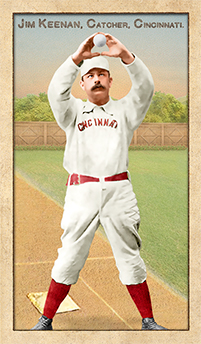
- Series: Beginnings: 1880's
- City: Cincinnati
- Team: Red Stockings (AA)
- League: American Association
James William Keenan (1858-1926) had a substantial major league career as a decent hitting catcher, primarily for Cincinnati. He got his start at the dawn of pro ball with his hometown entry in the National Association in 1875, its final season. The New Haven Elm Cities struggled to a 9th place finish but Keenan was on his way. He played minor league ball until the Buffalo Bisons of the NL hired him in 1880. After brief appearances with the Pittsburgh Alleghenys & Indianapolis Hoosiers, Jim caught on as a regular catcher with Cincinnati, 5 years with their AA team and his last two with the NL version, the Reds. A lifetime .240 average testifies to his skills at the plate in a rugged era for catchers. He played other positions and even gets his name in the record books: per the Encyclopedia of Baseball Catchers he is one of 41 receivers to pitch in major league games and his 2.37 ERA places him first all-time among his cohorts (he hurled 19 innings and was 0-1).
- As an emergency replacement at catcher for New Haven, Jim witnessed teammate Billy Geer make seven errors in one inning at second base
- Series: Beginnings: 1880's
- City: Philadelphia
- Team: Quakers
- League: National League
Charles H. Kelly (18??-????). Perhaps the most obscure player in this set, Charlie was a third baseman who made two brief major league appearances: he played in 2 games for the Philadelphia Quakers in 1883 and 1 game for the Philadelphia Athletics in 1886.
For his career, Kelly made one hit in 10 at bats. It was a triple and he did score a run. Perhaps his undoing was his defense, as he made 7 errors in 16 chances.
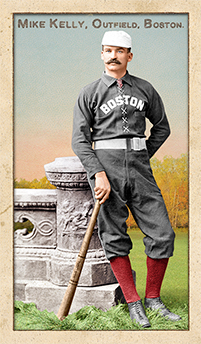
- Series: Beginnings: 1880's
- City: Boston
- Team: Beaneaters
- League: National League
- Hall: National Baseball Hall of Fame
Michael Kelly (1857-1894) was one of the great stars of the 1880s. He inspired America’s first pop record (“Slide, Kelly, Slide!”) in 1889 with a 1927 movie to follow. The “Chicago Slide” was copied by his White Stockings teammates, a “combination slide, twist and dodge” that allowed the team to “get away with hundreds of stolen bases when really they should have been touched out easily” per the Tribune’s Hugh Fullerton in 1906. A catcher, right-fielder and manager over 16 years, he popularized the hit & run.
- A pioneer athlete in vaudeville, $10,000 Kelly also popularized autograph signing
- First major leaguer to publish his autobiography (1888)
- Elected to Hall of Fame: 1945
- Although the Old Judge series features eleven known poses of Mike Kelly, I could not find one of suitable quality for this project. This image is taken from a cabinet photo produced by the Hastings Studio in Boston.
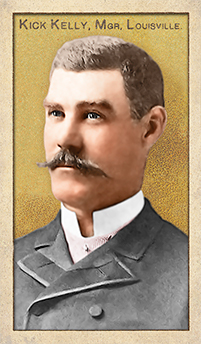
- Series: Beginnings: 1880's
- City: Louisville
- Team: Colonels
- League: American Association
John O. Kelly (1856-1926) was known variously as Kick, Honest John and Diamond John. He was a catcher for the Syracuse Stars and Troy Trojans in 1879 before turning to his real calling of refereeing, first in baseball and later in the boxing ring. As an operator of gambling houses in his native New York City, John “officiated” at another kind of gaming later in life.
Kick’s record at bat was a perfect motive to change uniforms. He averaged .155 in his 16 games in the early major leagues. By 1882 Kelly was umpiring in the National League and moved to the American Association the following season. Men in blue fared poorly in the diamond’s dawn. They were vilified and, too often, pelted by players and fans alike. Working alone gave ample opportunity for wily runners to cheat. Kelly lasted longer than most of his era. He and another “Honest John” (Gaffney) presided over the 1887 post-season match between the NL’s Wolverines and AA’s Browns. They pioneered a two-ump system that would transform the game.
- Kelly turned briefly to managing with the Louisville Colonels in 1887 and had a successful 76-60 season. His club flagged the following year and Kick was canned
- Refereeing Jim Corbett’s match in 1894 nearly cost Kelly his life. Baseball wasn’t the only hazardous profession for officials. Well-armed fans intimidated Kelly into a no-call
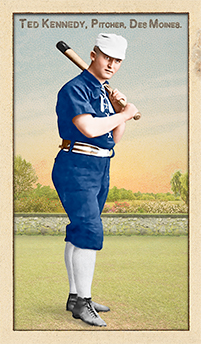
- Series: Beginnings: 1880's
- City: Des Moines
- Team: Prohibitionists
- League: Western Association
Theodore A. Kennedy (1865-1907) was an ill-starred young pitcher who learned from the best, executed effectively and, as so many of his era, flamed out early with a ruined shoulder. In our day, with Tommy John surgery nearly a rite of passage for aspiring big-leaguers, it is sobering to consider the plight of the young men of the 19th century who were thrown into unrelenting action and treated as disposable cogs in professional baseball's juggernaut. Such was the lot of Ted Kennedy. As a youth, he was ball boy in Peoria studying the not-yet-Old-Hoss Charlie Radbourn, the star pitcher for the town's very fine amateur squad. Radbourn was said to have been the first to master the overhand curve delivery that would carry him to greatness with Providence years later. Radbourn showed Ted the grip and Ted worked hard to learn it. He emerged in mid-west circles as one of the most promising young pitchers in 1884, a year of turmoil in the major leagues that left minor league teams scrambling for talent. The next season Kennedy got his break when Cap Anson brought him to Chicago. The Chicago Tribune's June 12 edition reported: “The Chicago team will place a new man in the pitcher's box today—Ned Kennedy, until recently with the Keokuk nine, and looked upon as one of the strongest unengaged pitchers in the country.” Ted's astounding strikeout record had made that reputation. Before the call-up, his highlight was 24 Ks, including 17 straight, in a game with no putouts by the first baseman against Burlington in October of '84. Sadly, Ted's arm didn't survive his rookie year. After hurling three games in two days, his shoulder gave out. Though he pitched one more year in the majors and a few in the minors, he was never the same. Kennedy later remembered, "I was terribly lame - had to pitch underhand. Every game I pitched that season it was like a rusty knife was being thrust into my shoulder."
- In retirement, Kennedy found a lucrative career in sporting goods, eventually selling out to the Spalding empire but continuing to teach youngsters how to throw the curve
- Ars Longa is indebted to the research of SABR's Craig Lammers for much of this bio
- Kennedy's uniform color on this card was changed in July, 2017 from black to blue to reflect recent reliable research by Craig Brown & friends at Threads of Our Game. One card was previously released featuring a black uniform.
- Series: Beginnings: 1880's
- City: Baltimore
- Team: Orioles
- League: American Association
Matthew Aloysius Kilroy (1866-1940). Kilroy pitched for 6 teams over 10 seasons; most famously for the Baltimore Orioles. Did you know that Matt Kilroy is the single season record holder with 513 Ks in 1886? That’s 72 Ks more than the next closest total. Kilroy’s 1st 2 years: 75-53, 137 GS, 132 CG, 730 Ks & 3.22 ERA. After his sophomore year, Kilroy would win 20+ games once more, but then descended into mediocrity – going 20-34 over the last 6 years of his career.
- Pitched a no-hitter: 10.6.86
- Series: Beginnings: 1880's
- City: St. Louis
- Team: Browns (AA)
- League: American Association
Charles Frederick Koenig (1863-1927). An excellent pitcher for 7 teams over 10 seasons, King was one of the 1st pitchers to use a sidearm delivery and was especially unique in that he threw without winding up. In his career, King won 203 games, striking out 1,229 batters with a 3.18 ERA. Currently, King ranks 93rd in career WAR for pitchers, higher than 15 HOF pitchers. Silver was pretty good.
- AA Wins champ: 1888
- AA ERA Chap: 1888
- PL ERA Champ: 1890
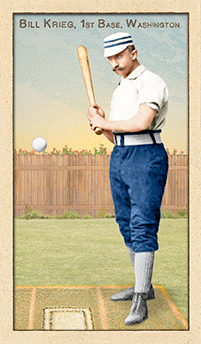
- Series: Beginnings: 1880's
- City: Washington, D.C.
- Team: Nationals
- League: National League
William Frederick Krieg (1859-1930) was a powerhouse in the minors, but barely left an impression in the big leagues. Coming out of Notre Dame, Krieg joined the Northwestern League's Springfield and Peoria teams in 1883. The following season he got a chance at the big time as the Union Association multiplied opportunities for young pro players. He signed on with the bi-city Chicago/Pittsburgh entry as their catcher, playing in 71 games with a .247 average. Over the next three seasons, Bill would roam among three other major league clubs and various minor league teams. His stints in the American Association and National League were brief and his output paltry.
When he finally resigned himself to play in the minors permanently, Krieg came into his own. In 1887 with the Minneapolis Millers he batted .402, second in the Northwestern League. He then became a terror in the Western Association, hitting .324 with St. Joseph in '89 and .339 with Milwaukee in ‘92, good for his first batting title. His second title was historically good, when he ravaged WA pitchers for an astounding .452 performance with the Rockford Forest Citys in 1895. He was the team's slugger, tallying 15 triples and 12 home runs.
While Krieg's time in the majors was brief, he showed remarkable durability in the game. He finally retired as a player in 1901 at age 42, but served one more season as manager for the Southern League Chattanooga squad. Bill even returned for one last hurrah as manager of Muscatine of the Central Association in 1912.
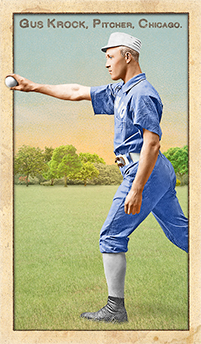
- Series: Beginnings: 1880's
- City: Chicago
- Team: White Stockings
- League: National League
August H. Krock (1866-1905) first pitched in the majors for Cap Anson’s Chicago White Stockings in 1888. He had a spectacular rookie season going 25-14 with a 2.44 ERA. Typical of his day, Gus finished what he started. He completed all 39 appearances with four shut-outs. Unfortunately, he struggled thereafter, never winning more than three games in a year. He came back with Chicago in ’89, then bounced to the Hoosiers, Senators and Bisons, exiting MLB after the 1890 season. As he helped Anson’s crew to a second-place finish in ’88, Gus had a face-off with a 40-year-old rookie for Washington, John Greenig. It would be a rare day for a rookie to make his big league debut at such an age and the press took note of the May 9 start. The White Stockings dispatched the hapless Greenig with nine quick runs and Krock was complimented for his steady performance, a five-hitter with Dummy Hoy doing the only damage with a homer and single.
- Before and after his years in the bigs, Gus played for Oshkosh, Milwaukee, and Sioux City in the Northwestern League and Western Association
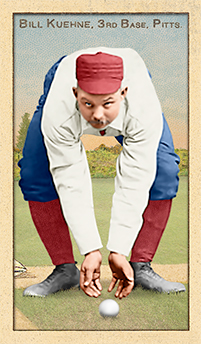
- Series: Beginnings: 1880's
- City: Pittsburgh
- Team: Alleghenys
- League: National League
William J. Kuehne (1858-1921) came out of the German-American semi-pro clubs of Chicago to begin his career in truly professional baseball with the Columbus Buckeyes of the American Association in 1883. After a month of dreadful play at 2nd base, his manager replaced him. Having a hole at 3rd, he gave Willie one more try. Kuehne found a home at the hot corner. What followed was a ten-year career in MLB in which the otherwise light-hitting but solidly-built (and not known for speed) Kuehne played as though every day was “triple or nothing.” His lifetime .232 average belied a penchant for three-baggers. His record for “most triples in a season without hitting a home run” (19 in 1885) lasted until another Willie--Keeler--tied it in 1897. SABR’s David Nemec has documented several other odd “firsts” set by Kuehne: “lowest slugging average with at least 100 triples,” four straight seasons with more triples than doubles, and most triples (115) in history by a player with fewer than 4500 plate appearances. One in every nine hits went for three.
- Series: Beginnings: 1880's
- City: Philadelphia
- Team: Athletics (AA)
- League: American Association
Henry E. Larkin (1860-1942). A good first baseman and an excellent hitter for 3 teams over 10 professional seasons, Larkin retired with a .303 lifetime batting average. Larkin batted over .300 6 times in his career and retired with an OPS+ of 142. His best season may have been 1890, when he hit .330, scored 93 runs and knocked in another 112 with an OPS of .901.
- Hit for the cycle: 1885
- Hit 4 doubles in one game – a record tied many times but never broken
- Series: Beginnings: 1880's
- City: St. Louis
- Team: Browns (AA)
- League: American Association
Walter Arlington Latham (1860-1952). Nicknamed “The Freshest Man on Earth” for his comedic personality, Latham was a 3rd baseman for 6 teams over 17 seasons & is credited as the 1st full-time base coach in history. Latham’s antics of distraction while coaching 3rd base inspired Major League Baseball to implement the coaching box.
- At age 49, became the oldest player to steal a base
- Ranks 8th all-time in SBs: 739
- Holds career record for errors at 3rd base: 822
- Series: Beginnings: 1880's
- City: Omaha
- Team: Omahogs
- League: Western Association
John Atkinson Leighton (1861-1956) enjoyed a lengthy baseball career from 1887 through 1901, but his only major league stint was for the Syracuse Stars of the American Association in 1890. He played in seven games and batted .296 while playing the outfield. A long-lived Massachusetts native, Leighton was considered the oldest living player until his death, whereupon he was succeeded in that status by Dummy Hoy. Leighton was part of the Stars’ only ML season. He was a teammate of their top hitter, Cupid Childs and their ace Dan Casey on the mound.
- Leighton appeared in the Old Judge series as a CF for the Omaha Omahogs, but there is no reference to him on the team’s roster
- Leighton did play for Syracuse and Providence in the International League and Lewiston in the New England League
- Series: Beginnings: 1880's
- City: Cleveland
- Team: Blues (AA)
- League: American Association
Thomas Joseph Loftus (1856-1910) played only 9 MLB games, as an outfielder, before moving on to his true calling: managing. He piloted six clubs in four leagues: the Union Assoc’s Brewers, the Cleveland Blues of the AA, Cleveland Spiders of the NL, the Reds in their first NL year, the Chicago Orphans also of the NL, and Washington Senators of the AL. In each managerial stint, Loftus had an ownership stake in the team.
- Managed over 1000 ML games with a record of 454-580
- Series: Beginnings: 1880's
- City: Chicago
- Team: Maroons
- League: Western Association
Herman C. Long (1866-1909). A shortstop for 5 teams over 16 seasons, Long was a member of 5 NL pennant-winning teams. Despite a good career, Long is perhaps best known as the record holder for total errors (1,096) & errors by a SS in a career (1,070). Despite these records, Long was statistically a better than average defender & was considered a good shortstop by his peers.
- NL HR Champ: 1900
- .300+ batting average: 4x
- 2 seasons with 100+ RBI; 2 with 100+ Runs
- Series: Beginnings: 1880's
- City: Omaha
- Team: Omahogs
- League: Western Association
Thomas Joseph Lovett (1863-1928) had a supernova-like splash of brilliance on the mound for the Brooklyn Bridegrooms before fading into obscurity. Lovett debuted in MLB for the Athletics in 1885, making only 16 appearances that summer. Signed by Brooklyn in its final year in the American Association, Lovett had his year-of-a-lifetime in 1890 with the newly minted NL Brooklyn franchise. He was 30-11 with a 2.78 ERA, pitched four complete games in the post-season, winning two in a series draw with Louisville. Lovett’s final brush with greatness occurred on June 22 the following year as he hurled a no-hitter against the Giants.
- Lovett’s career record was 88-59 with a 3.94 ERA
- He had one more strong year with Brooklyn in ’91 (23-19) before ending his tenure in Boston in ‘94
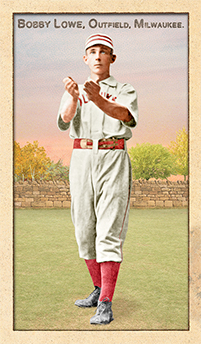
- Series: Beginnings: 1880's
- City: Milwaukee
- Team: Creams
- League: Western Association
Robert Lincoln Lowe (1865-1951) played a dozen years for the Boston Beaneaters, then a half dozen more for Chicago, Pittsburgh and Detroit. He could play every position and set several batting records in a long and illustrious major league career. Upon his retirement he held the best fielding average of all-time at second base, proving his value in all aspects of the game. Orphaned at 15, Lowe was a hard-working young man supporting his family in the Pittsburgh area. Friends convinced his employers to give Bobby time to play the game he clearly excelled at, leading to a chance with Eau Claire of the Northwestern League in 1887. After a couple seasons in the Western Associaton, Boston bought his contract, a deal once called “one of baseball's biggest bargains.” Lowe established himself as perhaps the best second-baseman of the 19th century and helped lead the team to five pennants. As the starter at second for eight straight seasons, Lowe formed a great double-play combo with Herman Long. With Fred Tenney at first and Jimmy Collins at third, the infield was touted by some as the best ever. When he moved to the Orphans (Cubs) in 1902, manager Frank Selee knew he had a leader and made Bobby the captain. Relegated to backing up Johnny Evers in '03, Lowe moved on to Detroit via a one-game stint with the Pirates and was named manager of the Tigers in '04. Upon his retirement from the majors, the Detroit News lauded Bobby's character: “There is no better type of the gentleman in baseball and no one ever heard ought but words of praise for him.”
- Among Lowe's batting accomplishments: first to hit four home runs in a game, first to hit for 17 total bases in a game, went six-for-six in another game, scored six times in yet another, batted over .300 five straight seasons
- Hit a solid .273 lifetime, with 74 home runs
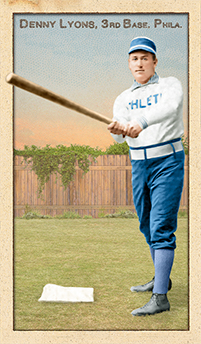
- Series: Beginnings: 1880's
- City: Philadelphia
- Team: Athletics (AA)
- League: American Association
Dennis Patrick Aloysius Lyons (1866-1929) was a strong hitting third-baseman over a thirteen year career in the major leagues from 1885 with Providence to 1897 with the Pirates. His lifetime batting average was .310. In 1890 he led the American Association in on-base percentage and slugging, and was second to Chicken Wolf in BA. He hit 62 home runs in the Deadball Era and was known as a formidable fielder in the no-glove era. Lyons’ era was also a time of rapid evolution in the game. In 1887, the year Denny “hit” safely in 52 straight, the pitcher’s box had been tightened and the pitcher’s delivery shortened to one step. Walks were also considered hits that year which has caused most modern students of the game to dismiss his “streak,” second only to Joltin’ Joe. But DiMaggio didn’t have to hit a fastball hurled from fifty feet. Only two of the 52 games was affected by walks but they were in the middle of the run. Despite such quibbles, Lyons was clearly a very accomplished player both offensively and afield.
- Consistently ranked among batting leaders in both leagues he starred in: AA and NL
- An Amos Rusie fastball broke two fingers and ended Denny’s ML tenure. He continued in the minors and hit .274 for the Beaumont Oil Gushers in 1903
- Series: Beginnings: 1880's
- City: Washington, D.C.
- Team: Nationals
- League: National League
- Hall: National Baseball Hall of Fame
Cornelius McGillicuddy, Sr. (1862-1956). An average catcher with strong leadership skills for 11 professional seasons (1886-1896), Mack then owned (1901-1954) and managed (1901-1950) the Philadelphia Athletics for half a century, establishing many managerial records and a unique place in the pantheon of baseball icons in the 20th century.
- 5x World Series Champion
- Most Managerial Wins: 3,731
- Most Managerial Losses: 3,948
- Elected to Hall of Fame: 1937
- Mack's uniform color in this card was changed from black to blue in August, 2017 to reflect recent reliable research conducted by Craig Brown and friends at Threads of Our Game. Nine cards were previously released featuring a black uniform
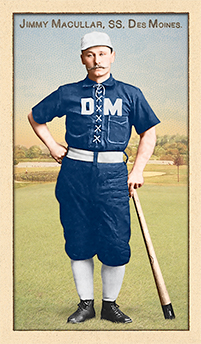
- Series: Beginnings: 1880's
- City: Des Moines
- Team: Prohibitionists
- League: Western Association
James F. Macullar (1855-1924) was a scrappy fellow with several noteworthy accomplishments. At a mere 5'6” Little Mac did not cut an imposing figure when he arrived in major league baseball by virtue of his Syracuse Stars being promoted into the National League in 1879. Macullar was the rare natural left-hander to bat right-handed, but any advantage accruing wasn't obvious as he generally hovered around the .200 mark at bat. It was in the field that he distinguished himself. By the end of his career, Macullar had set a record that still stands by playing more games (325) at shortstop than any other southpaw. That rookie season also saw Jimmy demonstrate leadership beyond his years when the twenty-four year old was given the management of the Stars for about a month. His weak hitting left him unemployed for a couple of years, but that didn't deter him from baseball. He and teammate Hick Carpenter headed to Cuba in the winter of '79-80 and became the first North Americans to play for the new league when they were signed by Colón. Despite Jimmy's limitations, he and Hick far outclassed the fledgling Cuban players and were so dominant that other teams refused to play against them. Macullar was hired by the new American Association's Cincinnati franchise in '82 and played stellar centerfield for the pennant-winners with his buddy Carpenter at third. The next season he was relegated to a utility role and his poor offensive production led to his demotion. Picked up by the Orioles, Jimmy saw regular action back at short through the 1886 season.
- Baltimore became Macullar's home and he served the city as a jailer over the next two decades.
- Jimmy contributed an outstanding play in centerfield to nail the White Sox' Abner Dalrymple at home to end the Reds' first post-season contest on October 6, 1882
- Macullar's uniform color on this card was changed in July, 2017 from black to blue to reflect recent reliable research by Craig Brown & friends at Threads of Our Game. One card was previously released featuring a black uniform.
- Series: Beginnings: 1880's
- City: Boston
- Team: Beaneaters
- League: National League
Michael Joseph Madden (1867-1896) had a gift for curving the baseball, dazzling his hometown Portland, ME media as a teen. He had a head for the game and the heart, but sadly, not the physique. At 120 lbs he proved simply too frail for the rigors of professional play and travel in the late 1880s. His heart and head were on display during his rookie season with the Beaneaters in 1887. No matter that, for that one season, batters got four strikes; the Kid was outstanding: 21-14, 3.79 ERA completing all 37 starts. Despite his breaking stuff, he never appeared in nearly as many games in his short MLB career, suggesting his managers recognized his physical limitations. Stayed in Boston for three leagues in three years before closing out with the Orioles in 1891.
- Young Michael was taken by “consumption,” leaving a widow and two children at age 28




